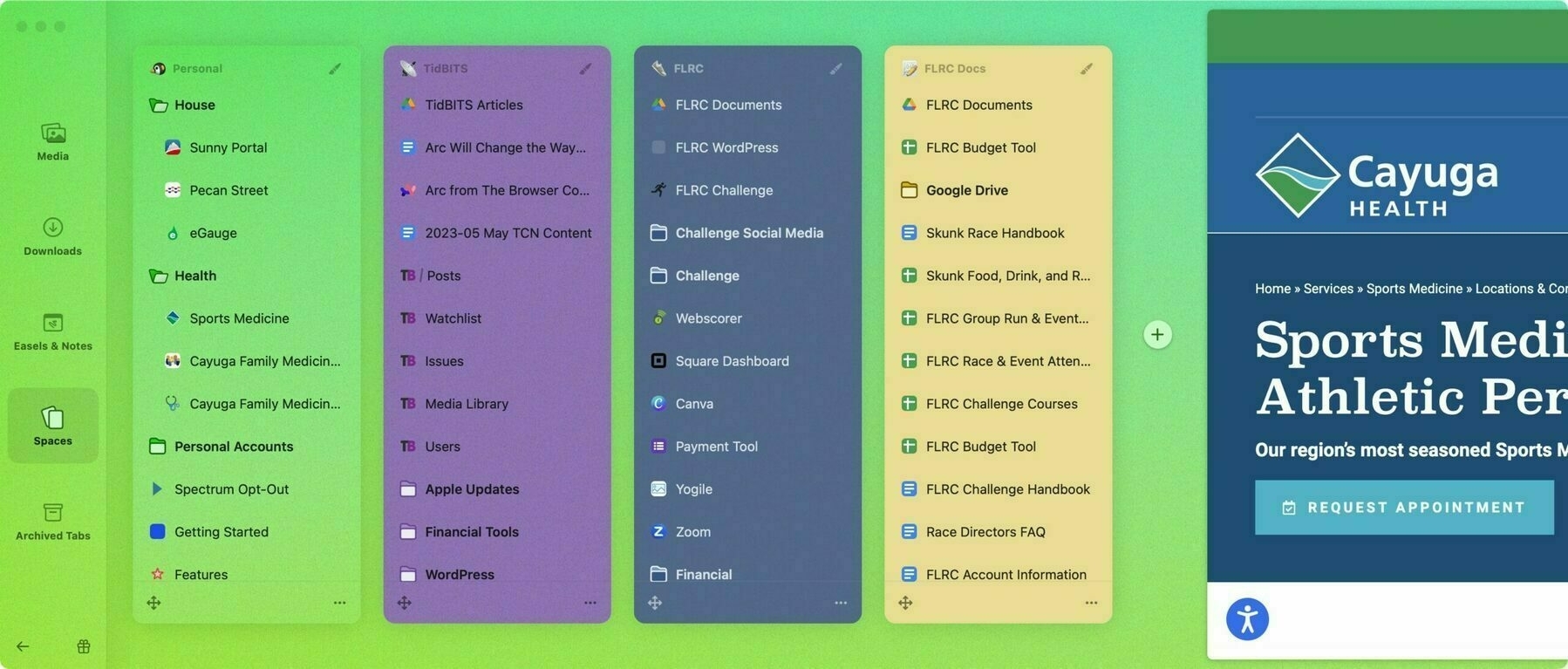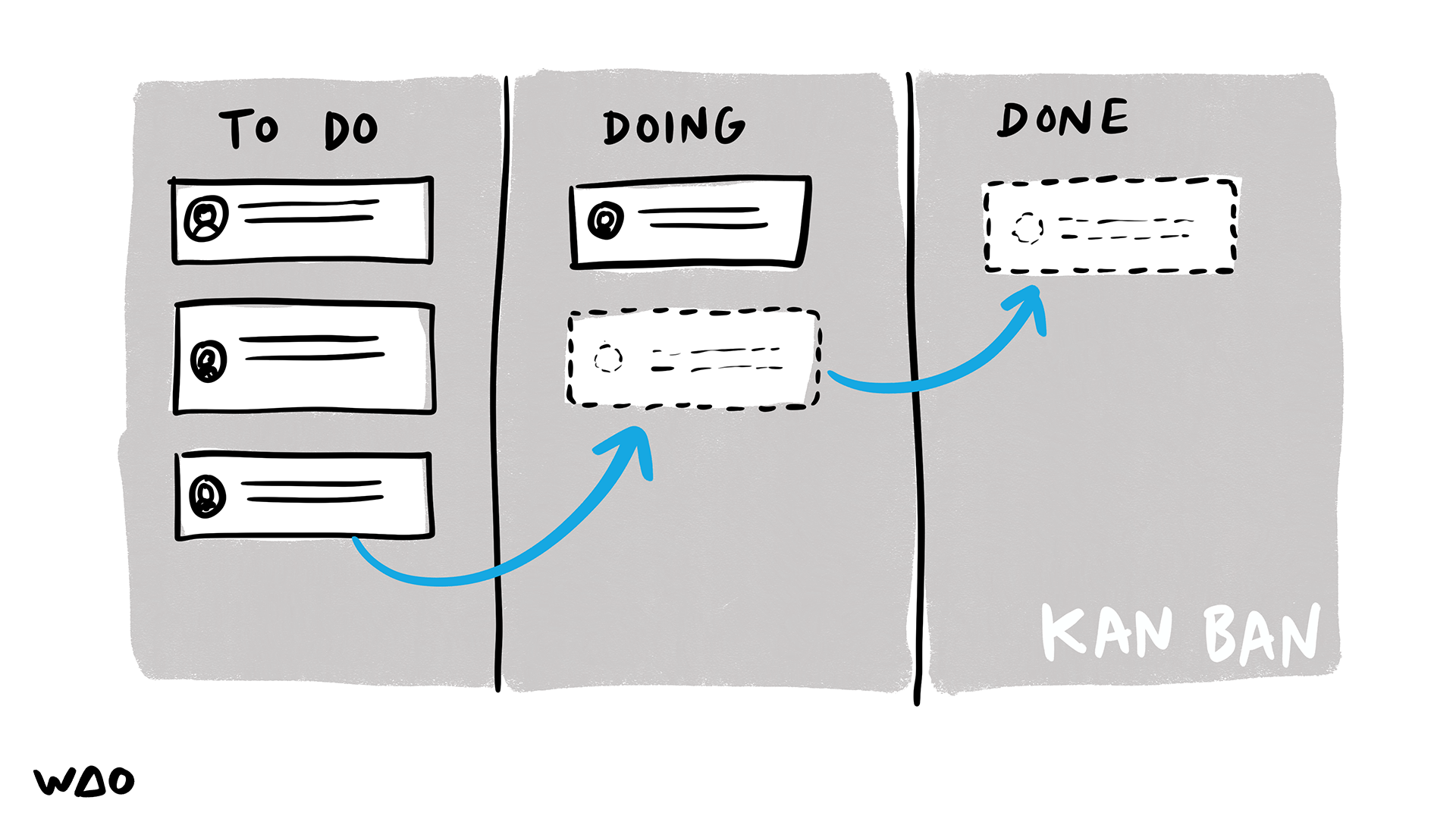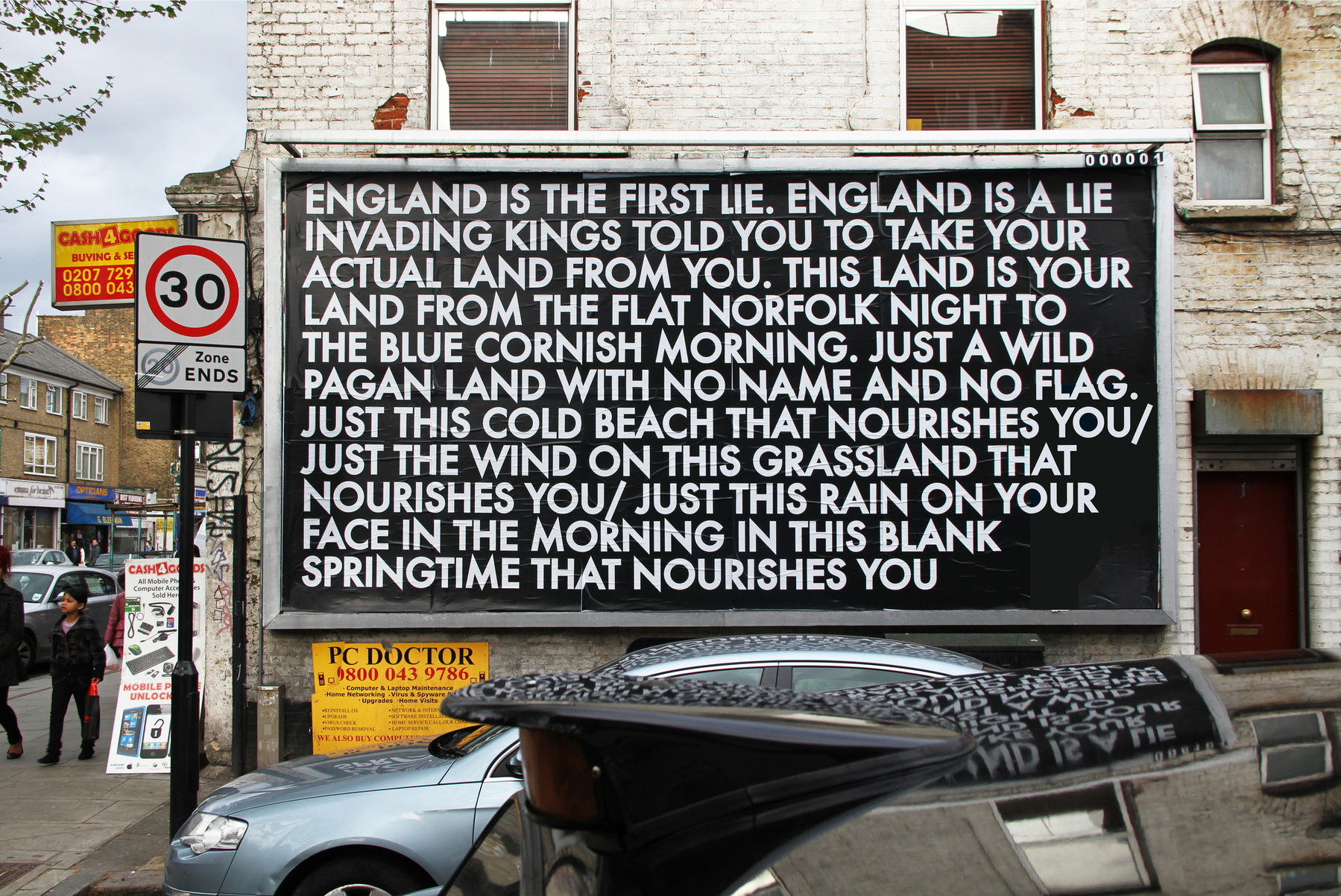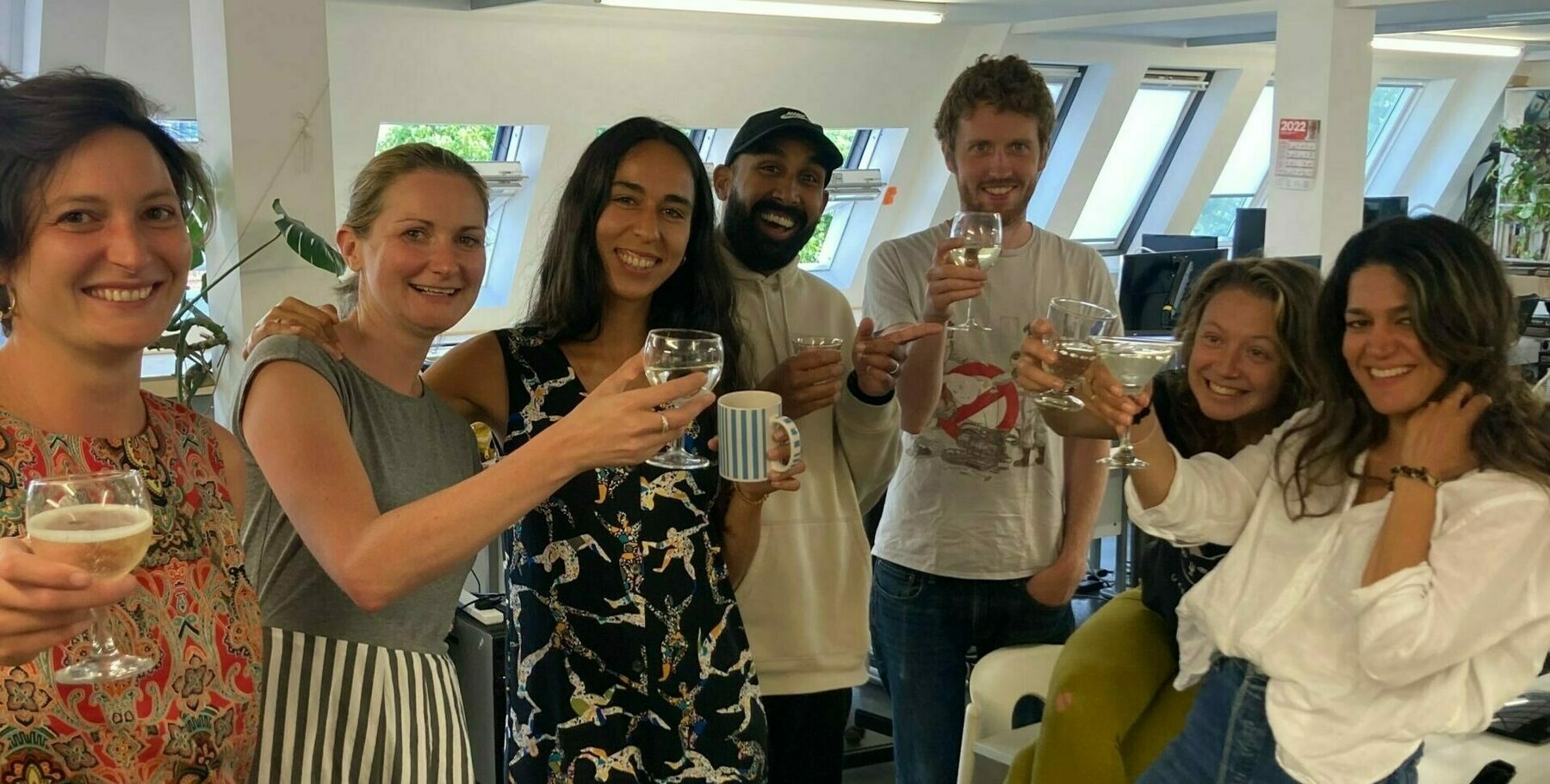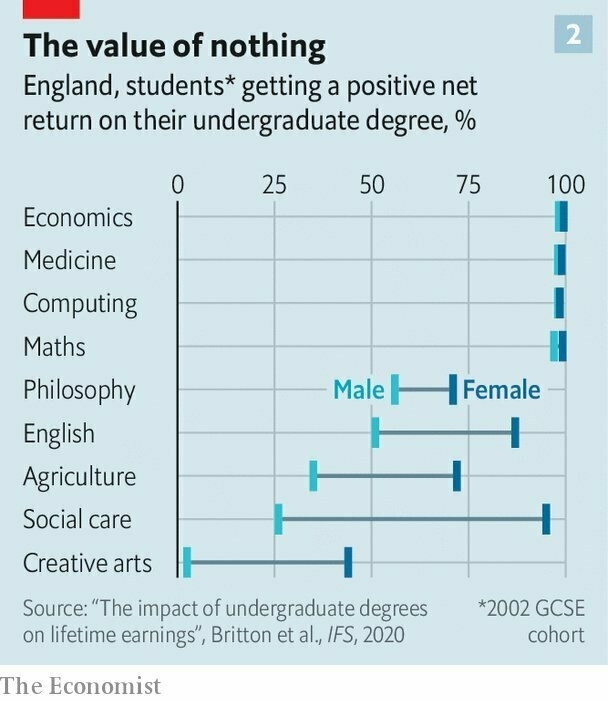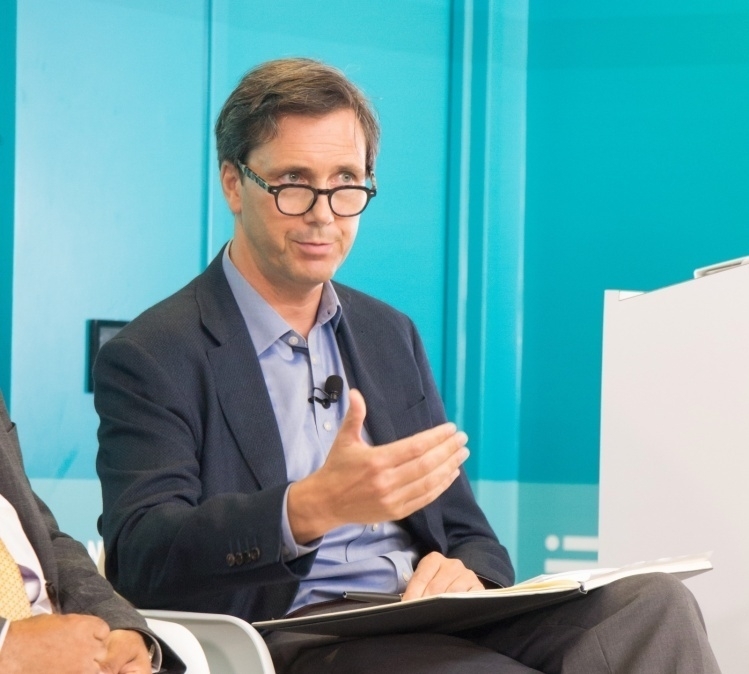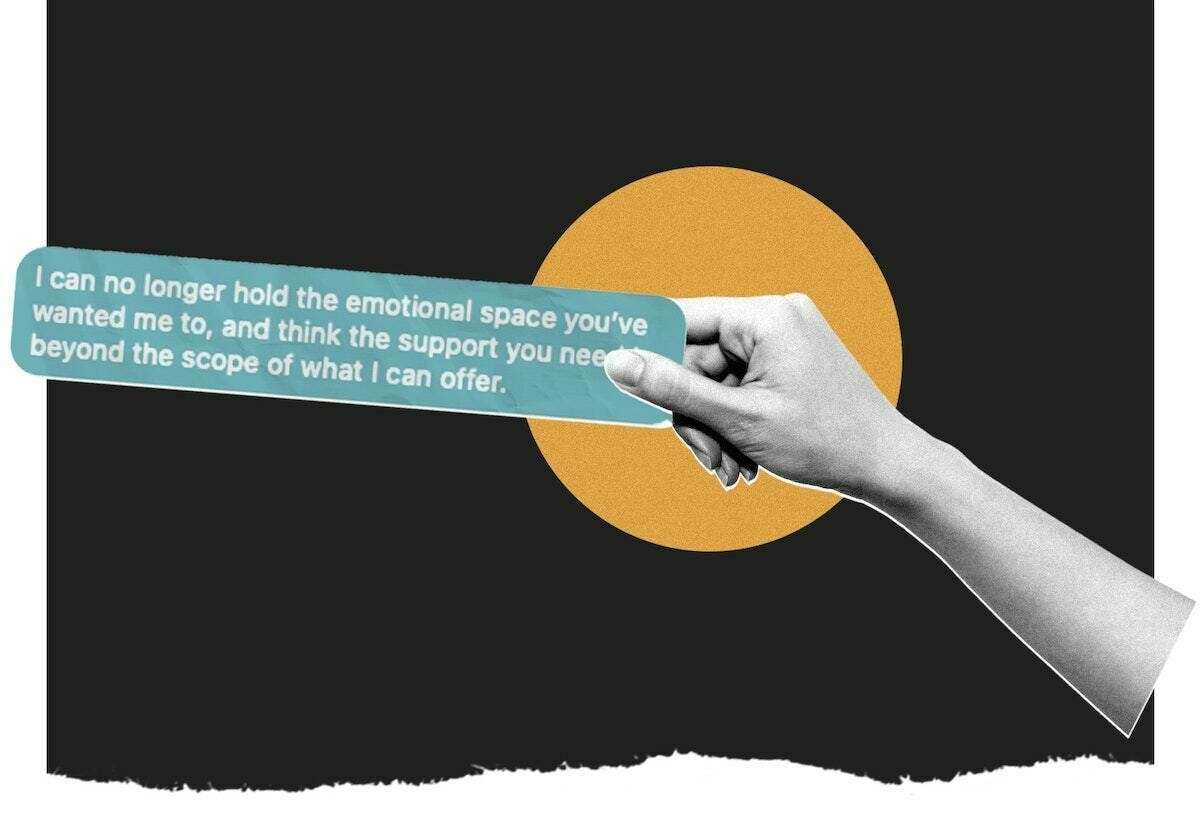- The rhetoric around Open Badges in the early days was that it would mean the end of universities. Instead, they have co-opted them as 'microcredentials' in a way that unbundles chunky degrees into bitesize pieces. Universities are now more likely to work with employers on these microcredentials, which is a benefit to employability, at the expense of a rounded 'liberal' education.
- My first degree was in Philosophy, which most people would assume makes you entirely unemployable. The reverse is actually true, especially for knowledge work. I should imagine that in a world where we need, for example, more AI ethicists, this trend will only continue.
Arc browser is pretty nifty
I’m not going to gush as I’ve had it installed mere hours, but this article persuaded me to actually use the invite code I’d got for the Arc browser. First impressions were good enough for it to replace Brave as my default, for the time being, on my Mac Studio.
My colleague Laura always has tabs for client projects to hand, as she has a Firefox extension which separates tab groups. Arc does this quickly, seamlessly, and by default. Also, I used to have my tabs at the side of my browser and I’m not sure why or how I got out of the habit of doing so.
There are lots of other nice things about Arc which are mentioned in the review. It’s Chromium-based, so everything just works, including bringing across your bookmarks, saved passwords, and browsing history.
I realize calling Arc “the most transformative app I’ve used in decades” is a bold statement that requires a lot of support. I won’t skimp on words in this article telling you why—it’s that important and requires new ways of thinking about how you work on the Web.Source: Arc Will Change the Way You Work on the Web | TidBITS[…]
If the sidebar is Arc’s most prominent interface element, Spaces is the feature that leverages it more than anything else in Arc. A Space is a collection of tabs in the sidebar. It’s easy to switch between them using keyboard shortcuts (Control-1, Control-2, etc., or Command-Option-Left/Right Arrow) or by clicking little icons at the bottom of the sidebar.
You can assign each Space a color, providing an instant visual clue for what Space you’re in. For me, Personal is a green/yellow/teal gradient, TidBITS is purple, and FLRC is blue, while my fourth space—set to hold FLRC tabs for Google Docs and Google Sheets—is yellow. Each Space can also have a custom emoji or icon that identifies it in the switcher at the bottom of the sidebar.
[…]
The most obvious part of Arc’s visual interface is its sidebar. As I said earlier, the sidebar provides access to multiple color-coded Spaces, each with its own collection of tabs. It’s easy to gloss over the importance of putting tabs in a sidebar, but that would be a mistake. Sidebar tabs aren’t simply a vertical version of tabs across the top of the browser window, they’re substantively better.
[…]
But what the sidebar really provides is a sense of comfort, of familiarity. There’s a French phrase, mise en place, that refers to setting out all your ingredients and tools before cooking so everything you need is at hand when you need it. Arc’s sidebar, when populated with the pinned tabs you use and arranged the way you think, provides that sense of mise en place. I actually want to sit down at Arc because it helps me channel my thoughts and actions toward my goals for the day.
Kanban > Scrum
I spend most of my time coordinating with one other human being at work. After that, I’m coordinating with a maximum of three other people internally, and then with clients.
So take what I’ve got to say about Kanban with a pinch of salt. But I’ve worked at bigger organisations, with more fancy methodologies. Still, nothing beats having a board which shows what’s to do, doing, and done (with some tweaks perhaps for ‘feedback needed’ and ‘undead’!)
I’m not saying Scrum doesn’t work. I’m saying the exact opposite. Scrum does work, but it works for the same reasons Kanban does. The difference between them is that Scrum is slower and more prescriptive, and thus less adaptable (or “agile”, whatever you wanna call it).Source: You don’t need Scrum. You just need to do Kanban right. | Lucas F. Costa[…]
[B]ecause Kanban focuses on tasks rather than sprint-sized batches, it pushes responsibility to the edges of the team, meaning engineers are responsible for going after the pieces of information they need to move forward.
When that happens, instead of designing features by committee, which demands a significant amount of back-and-forth discussions, decisions happen locally, and thus are easier to make.
Additionally, fewer people making decisions lead to fewer assumptions. Fewer assumptions, in turn, lead to shipping smaller pieces of software more quickly, allowing teams to truncate bad paths earlier.
Image: Visual Thinkery for WAO
Just this cold beach that nourishes you
I’ve come across so much great art and artists that are either directly or obliquely protesting the coronation, monarchy, and everything the Tories stand for. Here’s one from Robert Montgomery which, I think, is actually from the queen’s jubilee.
Source: BILLBOARDS — ROBERT MONTGOMERY
On co-operative dynamics
Abi Handley (second from the left in this photo) is an inspiration to me and others in the co-op movement. It was a little surprising, therefore, when she told me a couple of months ago that she was stepping down from being a member of Outlandish. After all, she’s been with them for 12 years, almost since the beginning.
As this blog post explains, however, part of understanding the dynamics within a co-operative is to know when to take the reins, and when to step back. She’ll continue to collaborate with Outlandish, but also more than others. This is great for us, and in fact she joined WAO during our last monthly co-op day to explore opportunities.
Congrats, Abi! Onwards and upwards 💪
What I’m trying to achieve in life has changed quite a lot since I started in Outlandish at 29. I’m now 41 and got two kids, a house, built a successful business with people whom I love and respect. So what’s my next challenge? How can I push myself next?Source: Abi is stepping down from being a member of Outlandish | Outlandish blog[…]
Integrity for me is one of the most important principles I try and live by. Modelling the behaviours and values I hold dear for me is the only true way I want to be. Being able to genuinely live and breathe what I support my clients to try in terms of ways of working is essential for me to be an authentic and valuable coach & facilitator. I need to do what I say to others to try (because I believe and see that it works when everyone opts in), always and in every team I work in.
I have struggled in letting go of the role of ‘Mum’ in Outlandish, despite desperately wanting to, and that is not a solo challenge – it is also incredibly difficult to change those kinds of dynamics within any group. By me stepping down, I am modelling the need to not be at the centre of all things Outlandish, because despite trying with all our might, it is so easy to step into the safe role of looking after things when its not going so well or a challenge comes up for us. I don’t think that serves my goals, nor Outlandish’s. I think the best way we can achieve Outlandish being even more co-operative than it already is, is by me stepping back. That’s a scary thing to do for us all, but I’m going to take the risk and be excited about what might happen, for all of us.
Comportamento Geral
As part of the #NotMyKing protests, I came across a printmaker and artist whose work I explored further. Highly discouraged by my wife from putting up something explicitly anti-monarchy, I instead placed this from Katherine Anteney on view through the window of my home office.
It’s from a Brazilian anti-dictatorship protest song from the 1970s and roughly translated as: “Everything is good, everything is great, but what happens tomorrow, mate, when they take your carnival away?"
Seems appropriate for this weekend, anyway.
It's time to strictly regulate vaping
My 16 year-old son estimates that about 70% of his year at school vapes. He might be exaggerating a bit, but there are clouds of vape fumes that accompany students leaving the local school as they walk home.
Vaping may well be safer than smoking, but we're not sure of the long-term effects, and nicotine remains an addictive substance. That's not to mention the effect on the planet of single-use vapes.
So I'm pleased that the Australian government have taken a hard line on this, and hope other countries do likewise. It's a nonsense to see tobacco hidden behind a counter and screen, while vapes are on sale next to bread and milk on supermarket shelves.

Recreational vaping will be banned in Australia, as part of a major crackdown amid what experts say is an "epidemic".
[...]
Also known as e-cigarettes, vapes heat a liquid - usually containing nicotine - turning it into a vapour that users inhale. They are widely seen as a product to help smokers quit.
But in Australia, vapes have exploded in popularity as a recreational product, particularly among young people in cities.
"Just like they did with smoking… 'Big Tobacco' has taken another addictive product, wrapped it in shiny packaging and added sweet flavours to create a new generation of nicotine addicts," [Health Minister Mark] Butler said in a speech announcing reforms on Tuesday.
[...]
Research suggests one in six Australians aged 14-17 years old has vaped, and one in four people aged 18-24.
"Only 1 in 70 people my age has vaped," said Mr Butler, who is 52.
He said the products are being deliberately targeted at kids and are readily available "alongside lollies and chocolate bars" in retail stores.
Source: Australia to ban recreational vaping in major public health move | BBC News
NYC 🫶 renewable energy
New York’s Build Public Renewables Act (BPRA) demonstrates the strength of grassroots movements and the potential of publicly owned utilities to lead the way in the adoption of renewable energy.
This serves as a reminder that decentralised power structures can be more agile and responsive to the needs of the public. When communities have a say in decision-making processes, they can make bold moves towards a sustainable future, create new jobs, and ensure equitable access to clean, affordable energy. ✊
New York state has passed legislation that will scale up the state’s renewable energy production and signals a major step toward moving utilities out of private hands to become publicly owned.Source: New York takes big step toward renewable energy in ‘historic’ climate win | The Guardian[…]
The Build Public Renewables Act (BPRA) will ensure that all state-owned properties that ordinarily receive power from the New York power authority (NYPA) are run on renewable energy by 2030. It will also require municipally owned properties – including many hospitals and schools, as well as public housing and public transit – to switch to renewable energy by 2035.
[…]
The passage of this first-of-its-kind law comes after years of grassroots campaigning by climate and environmental organizers in New York state.
[…]
Historically, when utilities are owned by investors, profits go to shareholders. But in publicly owned models, profits are reinvested in the utility’s operations. Rates on energy bills are also generally lower.
[…]
The newly passed law also ensures creation of union jobs for the renewable projects, guaranteeing pay rate protection, offering retraining, and making sure that new positions are filled with workers who have lost or would be losing employment in the non-renewable energy sector.
The 'value' of a degree
I’ve got two things to say about this article in The Economist. One is to do with alternative credentialing, and the other is to do with my first degree.
Source: Was your degree really worth it? | The EconomistIn England 25% of male graduates and 15% of female ones will take home less money over their careers than peers who do not get a degree, according to the Institute for Fiscal Studies (IFS), a research outfit. America has less comprehensive data but has begun publishing the share of students at thousands of institutions who do not manage to earn more than the average high-school graduate early on. Six years after enrolment, 27% of students at a typical four-year university fail to do so, calculate researchers at Georgetown University in Washington, dc. In the long tail, comprising the worst 30% of America’s two- and four-year institutions, more than half of people who enroll lag this benchmark.
[…]
Earnings data in Britain call into question the assumption that bright youngsters will necessarily benefit from being pushed towards very selective institutions, says Jack Britton of the ifs. In order to beat fierce competition for places, some youngsters apply for whatever subject seems easiest, even if it is not one that usually brings a high return. Parents fixated on getting their offspring into Oxford or Cambridge, regardless of subject, should take note. But there is also evidence that tackling a high-earning course for the sake of it can backfire. Norwegian research finds that students whose true desire is to study humanities, but who end up studying science, earn less after ten years than they probably otherwise would have.
How to hold a 'preferendum'
I like this idea a lot. The only caveat is that we could potentially be ruled by “the will of the people” in a way that degenerates into the worst kind of populism.
However, I get the feeling that if this happens often enough, in practice it would be at worst benign, and at best a net benefit to democracy.
The preferendum is a highly promising instrument for public decision-making, especially when it is preceded by a well-designed, deliberative group of citizens representative of the public at large and succeeded by clear government action. It can be integrated within existing structures of public participation and might help bridge the gap between deliberative and representative processes.An explanation of how it would work:
At the polling station during the next general election, you get not one but two ballot papers. The first is your usual list of candidates and their political parties. The second is something new — a document with 30 different proposals that you are invited to analyze, one after the other.Source: Democracy’s Missing Link | NOEMAUnderneath each idea it says “strongly disagree,” “disagree,” “agree,” “strongly agree,” etc. It feels like one of those online questionnaires you’ve seen many times before.
At the bottom of the form, you are invited to highlight the five proposals you care about most. Every citizen in your country on voting day would be looking at the same list and doing what you are doing in the voting booth: rating and ranking proposals. The goal is to establish a list of shared priorities.
The process looks like a referendum, a process you might’ve participated in before. But where a referendum asks you for a straight yes or no answer to a certain question, this new process — this preferendum — has a much richer interface for indicating your policy preferences. You get to translate your individual preferences into the collective priorities of your community.
The problem with feminism is not that it has gone too far. It is that it has not gone far enough.
I listened to a podcast episode earlier this week entitled What the World of Psychology Gets Wrong About Men. After a few minutes, I considered turning it off, as I felt that the guest, Dr. John Barry, was about to stray into “men are under attack” territory.
But I kept listening, and I was wrong. It was a really balanced, well-structured conversation which pointed out how problematic the term “toxic masculinity” is when it’s applied to any behaviour we don’t like that’s exhibited by men. That’s not how the phrase originated.
This article is a review of Richard Reeves' new book. What struck me about it was the discussion of how young men’s veneration of hugely problematic figures such as Jordan Peterson, Andrew Tate, and Donald Trump is a symptom of male alienation. “Women’s lives have been recast. Men’s lives have not.”
In his new book, 'Of Boys and Men', Richard Reeves argues that the [crisis of masculinity] is structural. Society has undergone profound cultural and economic changes in the past few decades and many of them have left men—especially working-class men—disoriented and demoralized. As certain structural barriers that used to hinder women have been removed, women have proven their “natural advantage” in several areas, including in our colleges and universities. The structural disadvantages faced by men, meanwhile, have only become more entrenched during the same period. Several rounds of globalization, more outsourcing of traditionally “male” sectors like heavy industry, increasing automation, and greater workplace competition from women meant that, for many men, the economic picture has been getting bleaker by the year.Source: Have Men Become Culturally Redundant? | Commonweal MagazineAs a result, many men are struggling to fulfill their own outmoded expectations of what a man should be. “The problem with feminism, as a liberation movement, is not that it has ‘gone too far,’” Reeves writes. “It is that it has not gone far enough”—that is, it has not succeeded in replacing traditional models of masculinity with something more adequate to our current circumstances. The Western male is stuck in a culture of masculinity that is now desperately mismatched with his material reality. “Women’s lives have been recast,” Reeves writes. “Men’s lives have not.” Men have been consigned to “cultural redundancy.”
[…]
Addressing the kind of male disadvantages that Reeves catalogs does not mean ignoring or excusing inequalities that favor men over women. It’s possible, Reeves writes, to “hold two thoughts in our head at once.” Indeed, it’s urgent that we do so.
The future of AI will always be more than six months away
A remarkably sober look at the need for regulation, transparency around how models are trained, and costs in the world of AI. It makes a really good point about the UX required for machine learning to be useful at scale.
“I have learned from experience that leaving tools completely open-ended tends to confuse users more than assist,” says Kirk. “Think of it like a hall of doors that is infinite. Most humans would stand there perplexed with what to do. We have a lot of work to do to determine the optimal doors to present to users.” Mason has a similar observation, adding that “in the same way that ChatGPT was mainly a UX improvement over GPT-3, I think that we’re just at the beginning of inventing the UI metaphors we’ll need to effectively use AI models in products.”Source: AI Can’t Take Over Everyone’s Jobs Soon (If Ever) | IEEE Spectrum[…]
Augmenting work with AI could be worthwhile despite these problems. This was certainly true of the computing revolution: Many people need training to use Word and Excel, but few would propose typewriters or graph paper as a better alternative. Still, it’s clear that a future in which “we automate away all the jobs, including the fulfilling ones,” is more than six months away, as the Future of Life Institute’s letter frets. The AI revolution is unfolding right now—and will still be unfolding a decade from today.
An urgency to somehow bend the algorithms
The album ‘Homework’ by Daft Punk came out in 1997 when I was 16 years old. That’s the same age as my son is now. I think it’s fair to say that it changed my life.
When I worked in HMV as a student, I used my access to the huge database to discover and order in rare Japan-only releases of Daft Punk’s music. I also discovered music that the duo behind Daft Punk, Thomas Bangalter and Guy-Manuel de Homem-Christo, released on their own labels.
I was sad when I learned that Daft Punk was to be no more, but reading this interview with Thomas Bangalter in The Guardian helps make sense. I think it’s particularly important in life not to become a caricature of yourself. For Bangalter going from scoring a film like Irréversible to ballet couldn’t be more different, really.

Did the future lose its allure at some point? “It’s interesting,” he ponders. “You either have the content or the form. Every artist wants to create their own little revolution and try to do things that haven’t been done. That’s kind of the punk aspect. But you ultimately become a caricature of yourself once you succeed.” The point, he says, is to do something different every time. “It works in opposition. These robots, they’re like the glorification of technology. But even in 2005, when we made this film Electroma, they wanted to become human. It’s human nature – the grass is always greener on the other side.”Source: Up all night to get jeté! Thomas Bangalter on hanging up his Daft Punk helmet – and leaping into ballet | The Guardian[…]
Where does Bangalter feel Daft Punk’s influence now? “There used to be a lot of barriers between genres of music. I was hopeful there was a possibility to break these. That was part of the message of what we did musically.” Pop tribalism is indeed over, and while that can’t be credited to Daft Punk alone – piracy, streaming and three decades of internet did their bit – his hunch was once again correct.
“In some way the world is much more polarised now, but not really musically – musically there is this ability to mix and match and create levels of conflicting aesthetics or clashing ideas. I just hope that the tolerance existing right now in music will exist more in society as well.” The defecting robot has one more warning: “Now there is an urgency to somehow bend the algorithms.”
The patchwork progress of maturity
This short post outlines in a pithy way how being an adult is so difficult: we mature in different aspects of our lives at different rates. In turn, this makes relationships difficult — especially as a parent.

We tend to think of immaturity and maturity as dichotomous, uniform states. Once you leave behind the former and enter the latter, you’re mature through and through.
Yet, in reality, maturation follows a patchwork pattern of progress.
[...]
Maybe you react to receiving criticism with stoic equilibrium, but respond to having your birthday forgotten with perturbed petulance.
Maybe you can give a presentation at work with perfect confidence, but can’t approach an attractive woman without sweat-inducing fear.
[...]
As the midcentury writers Harry and Bonaro Overstreet put it, “All through life we have to take turns, as it were, being ‘parents’ to one another — because we all take turns at being children.”
Source: Sunday Firesides: Parent the Immature in Others | The Art of Manliness
Image: Midjourney (prompt in alt text)
Fitting LLMs to the phenomena
The author of this post really needs to read Thomas Kuhn’s The Theory of Scientific Revolutions and some Marshall McLuhan (especially on tetrads).
What he’s describing here is to do with mindsets, the attempt we make to try and fit ‘the phenomena’ into our existing mental models. When that doesn’t work, there’s a crisis, and we have to come up with new paradigms.
But, more than that, to use McLuhan’s phrase, we “march backwards into the future” always looking to the past to make sense of the present — and future.
I have a theory that technological cycles are like the stages of Squid Game: Each one is almost entirely disconnected from the last, and you never know what the next game is going to be until you’re in the arena.Source: The new philosophers | Benn StancilFor example, some new technology, like the automobile, the internet, or mobile computing, gets introduced. We first try to fit it into the world as it currently exists: The car is a mechanical horse; the mobile internet is the desktop internet on a smaller screen. But we very quickly figure out that this new technology enables some completely new way of living. The geography of lives can be completely different; we can design an internet that is exclusively built for our phones. Before the technology arrived, we wanted improvements on what we had, like the proverbial faster horse. After, we invent things that were unimaginable before—how would you explain everything about TikTok to someone from the eighties? Each new breakthrough is a discontinuity, and teleports us to a new world—and, for companies, into a new competitive game—that would’ve been nearly impossible to anticipate from our current world.
Artificial intelligence, it seems, will be the next discontinuity. That means it won’t tack itself onto our lives as they are today, and tweak them around the edges; it will yank us towards something that is entirely different and unfamiliar.
AI will have the same effect on the data ecosystem. We’ll initially try to insert LLMs into the game we’re currently playing, by using them to help us write SQL, create documentation, find old dashboards, or summarize queries.
But these changes will be short-lived. Over time, we’ll find novel things to do with AI, just as we did with the cloud and cloud data warehouses. Our data models won’t be augmented by LLMs; they’ll be built for LLMs. We won’t glue natural language inputs on top of our existing interfaces; natural language will become the default way we interact with computers. If a bot can write data documentation on demand for us, what’s the point of writing it down at all? And we’re finally going to deliver on the promise of self-serve BI in ways that are profoundly different than what we’ve tried in the past.
Žižek on ChatGPT
Slavoj Žižek is never the easiest academic to read, and this (translated) article about ChatGPT and AI is no different. However, if you skip the bizarre introduction, I do think he makes an interesting point about people being able to blame AI’s for ambiguity and misunderstandings.
Just as we create an online avatar through which to engage the Other and affiliate with online fraternities, might we not similarly use AI personas to take over these risky functions when we grow tired, in the same way bots are used to cheat in competitive online video games, or a a driverless car might navigate the critical journey to our destination? ... We just sit back and cheer on our digital AI persona until it says something completely unacceptable. At that point, we chip in and say, ‘That wasn’t me! It was my AI.’Source: ChatGPT Says What Our Unconscious Radically Represses | Sublation MagazineTherefore, the AI “offers no solution to segregation and the fundamental isolation and antagonism we still suffer from, since without responsibility, there can be no post-givenness.” Rousselle introduced the term “post-givenness” to denote “field of ambiguity and linguistic uncertainty that allows a reaching out to the other in the field of what is known as the non-rapport. It thus deals directly with the question of impossibility as we relate to the other. It is about dealing with our neighbour’s opaque monstrosity that can never be effaced even as we reach out to them on the best terms.”
[…]
“We dream outside of ourselves today, and hence that systems like ChatGPT and the Metaverse operate by offering themselves the very space we have lost due to the old castrative models falling by the wayside.” With the digitized unconscious we get a direct in(ter)vention of the unconscious - but then why are we not overwhelmed by the unbearable closeness of jouissance (enjoyment), as is the case with psychotics?
Relationships and therapy-speak
I’m hugely supportive of people choosing therapies such as CBT and using language from NVC. However, it’s possible to go too far.
My wife has told me “not to use that language” with her before when she thinks that I’m using it in a way that doesn’t feel in some way natural. And it seems that it’s particularly prevalent in younger generations? Interesting article.
In recent years, therapy concepts like self-care and boundary-setting have shown up everywhere online, with Instagram accounts and other social media communities sharing mantras and advice advocating for self-actualization. TikTok therapists like Nadia Addesi and TherapyJeff offer tips for struggling with anxiety, self-esteem, and people-pleasing. “Therapy speak” — prescriptive language describing certain psychological concepts and behaviors — can be found everywhere from group chats to dating apps. Now, we have more language to advocate for ourselves and our needs, whether it be canceling plans when we feel overwhelmed or ending relationships that no longer serve us.Source: Is Therapy-Speak Making Us Selfish?It’s important to be able to set boundaries and advocate for yourself. Occasionally, though, the emphasis on protecting one’s individual needs can overlook the fact that someone else is on other side of that boundary-setting. In 2019, for instance, a relationship coach’s Twitter thread offering a template for telling friends in need of support that you’re “at capacity” at the moment drew criticism for equating friendship to emotional labor. Earlier this year, a clinical psychologist’s TikTok video outlining how to break up with a friend went viral after viewers pointed out that it sounded like a missive from HR. Critics have noted that personal relationships require a touch more compassion than some of these therapeutic blueprints offer.
[…]
There are reasons a person might be tempted to overindulge in some of this self-care behavior. Conflict can be difficult, and people might think they can avoid it by asserting their needs in a way that prevents the other person from responding — by using HR language to end a friendship, for instance, or via straight-up ghosting. And by couching the behavior in therapy language, the hard “boundary” can feel more legitimate, or even virtuous.
[…]
Beyond boundary-setting and inflexibility, the proliferation of therapy speak has also inspired some people to assign labels like “toxic” and “narcissistic” to certain relationships or behaviors. Though toxic people and narcissists do exist, these armchair diagnoses don’t always accurately capture every dynamic, and being on the receiving end of this language can be destabilizing when it’s misplaced.
More on why billionaires should not exist
This article frames ultra-rich people owning and using superyachts and private jets as ‘theft’ because it reduces the amount of time we’ve got to avert climate disaster.
Yes, it is.
But it’s also theft because the purchase of these yachts and jets are only possible because of the enormous sums of money stolen from workers to fund their extravagant lifestyles.
Owning or operating a superyacht is probably the most harmful thing an individual can do to the climate. If we’re serious about avoiding climate chaos, we need to tax, or at the very least shame, these resource-hoarding behemoths out of existence. In fact, taking on the carbon aristocracy, and their most emissions-intensive modes of travel and leisure, may be the best chance we have to improve our collective climate morale and increase our appetite for personal sacrifice, from individual behavior changes to sweeping policy mandates.Source: The Superyachts of Billionaires Are Starting to Look a Lot Like Theft | The New York TimesOn an individual basis, the superrich pollute far more than the rest of us, and travel is one of the biggest parts of that footprint. Take, for instance, Rising Sun, the 454-foot, 82-room megaship owned by the DreamWorks co-founder David Geffen. According to a 2021 analysis in the journal Sustainability, the diesel fuel powering Mr. Geffen’s boating habit spews an estimated 16,320 tons of carbon-dioxide-equivalent gases into the atmosphere annually, almost 800 times what the average American generates in a year.
And that’s just a single ship. Worldwide, more than 5,500 private vessels clock in about 100 feet or longer, the size at which a yacht becomes a superyacht. This fleet pollutes as much as entire nations: The 300 biggest boats alone emit 315,000 tons of carbon dioxide each year, based on their likely usage — about as much as Burundi’s more than 10 million inhabitants. Indeed, a 200-foot vessel burns 132 gallons of diesel fuel an hour standing still and can guzzle 2,200 gallons just to travel 100 nautical miles.
Negative UK growth
Growth isn't everything. However, the fact that the word 'Brexit' does not appear anywhere in this article tells you all you need to know about (a) British politics, and (b) the relationship between the government and the BBC.
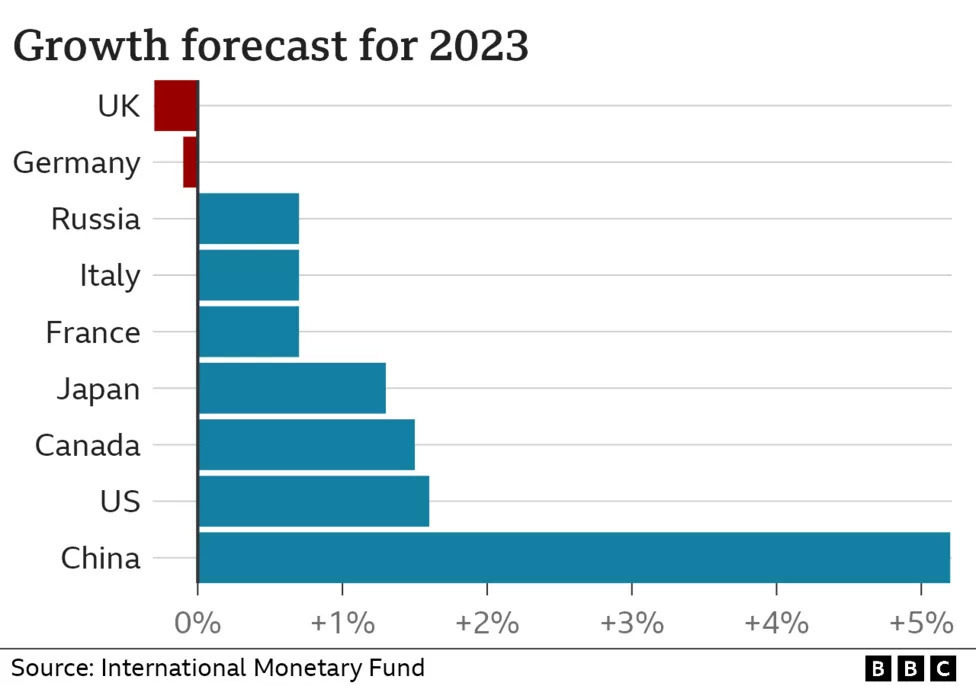
The UK is set to be one of the worst performing major economies in the world this year, according to the International Monetary Fund (IMF).
[...]
IMF researchers have previously pointed to Britain's exposure to high gas prices, rising interest rates and a sluggish trade performance as reasons for its weak economic performance.
[...]
Liberal Democrat Treasury spokesperson Sarah Olney said the forecast was "another damning indictment of this Conservative government's record on the economy".
Source: UK to be one of worst performing economies this year, predicts IMF | BBC News
